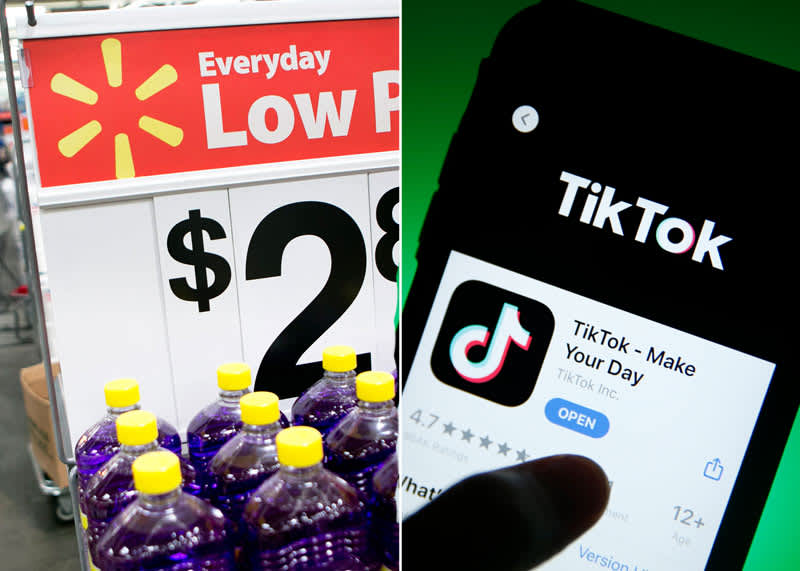Why TikTok deal could mean big growth for Walmart’s ads business

Getty Images
Walmart confirmed over the weekend it had tentatively agreed to purchase a 7.5% stake of TikTok in the U.S., alongside Oracle‘s larger 12.5% stake.
That deal could be a boon for the retailer’s tiny but growing advertising business.
Although it’s known for its big-box stores, Walmart has an advertising business that resembles Amazon’s, albeit on a much smaller scale. On Walmart’s own website, advertisers can sponsor their products to appear prominently in search or on product detail pages. It also has a display advertising network, which lets advertisers reach Walmart customers both on the retailer’s own digital properties and off-site, whether that’s on other websites or on social channels like Instagram or Pinterest.
Walmart Media Group boasts about its “massive scale” and “massive reach” to advertisers, saying 160 million customers visit its stores or its website every month, and claims 90% of households have shopped at Walmart at least once in the prior 12 months, attributing 2020 data.
But in its 2020 annual report, the company said Walmart Media Group along with “fuel and financial services and related products” make up less than 1% of annual net sales.
By way of comparison, in Q2, Amazon’s “Other” business segment, which “primarily includes sales of advertising services,” accounted for $4.2 billion in net sales, a bit less than 5% of the company’s total. It’s consistently growing around 40% on an annualized basis.
A young, engaged userbase
In general, analysts point to TikTok’s large and engaged userbase as an opportunity for Walmart’s ads business. In particular the retailer is wildly popular with young consumers seeking inexpensive wares they can doll up with DIY projects, which they then show off on TikTok.
Credit Suisse analysts noted that TikTok’s estimated 50 million U.S. daily users is a huge leap over the 1.5 to 2 million people who shop on Walmart U.S. every day, although they noted it’s not a straight apples-to-apples comparison.
Nicole Perrin, an analyst with eMarketer, pointed out that Walmart’s ads business is “tiny but growing,” but said it has gotten a “supercharge” during the pandemic with so many consumers buying groceries and other items online.
Alyssa Stevens, a director of public relations and social media at Boston-based ad agency Connelly Partners, said TikTok’s super engaged audience makes it extremely compelling for advertisers and brands, especially since it’s pushing cultural trends that drive purchases. For example, last year, Marc Anthony True Professional saw sales of a hair curling product increase 60% at stores like Walmart and Target after they were the subject of viral TikTok videos showing off the product. Walmart itself was an early adopter of running branded campaigns on TikTok.
“If I’m Walmart, I want to own that platform that’s defining those cultural trends and really use it to inform my retail and ecommerce business,” Stevens said. “I’m sure that Walmart is also saying, OK, well Amazon did a great job with [The Drop] and these influencer-collaborated collections, could TikTok then work with Walmart to have creators on TikTok to come up with their own collections of products…”
Michelle Capasso, director of Media Services at Connelly Partners, said TikTok could follow in Amazon’s footsteps of being a place for brands who may not sell on the platform but want to capitalize on its users.
“TikTok is just so massive in the U.S. already, they could actually have a larger business on their hands in being able to translate their platform into ‘even if you’re not selling here, you want the eyeballs that are coming here,'” she said.
From the other side, Walmart could help TikTok accelerate its own young advertising business with a built-out sales team and strong industry reputation. TikTok has been growing its base of tools for shopping ads and recently rolled out a self-service platform that lets companies buy and manage ad campaigns directly, a move to lure the ad dollars of small and medium-sized businesses.
One potential hiccup: Other retailers could shy away from advertising on a platform that’s partially Walmart-owned. Jordan Berke, founder of Tomorrow Retail Consulting, who led Walmart’s e-commerce activities in China for nearly a decade, said Walmart would likely follow in Amazon’s footsteps with its handling of Amazon’s cloud clients, assuring advertisers their data is protected and not exposed to Walmart. (Walmart in 2017 reportedly asked some tech vendors to stop using cloud apps that run on Amazon Web Services.)
“Staunch opponents of Walmart may decide they would like to take their money elsewhere,” Berke said. “But keep in mind that Facebook is building a commerce business and Google is building a commerce business, so over time there will be commerce connections and potential competition with a lot of the major media leaders.”
Michael Bloom and Annie Palmer contributed to this report.
